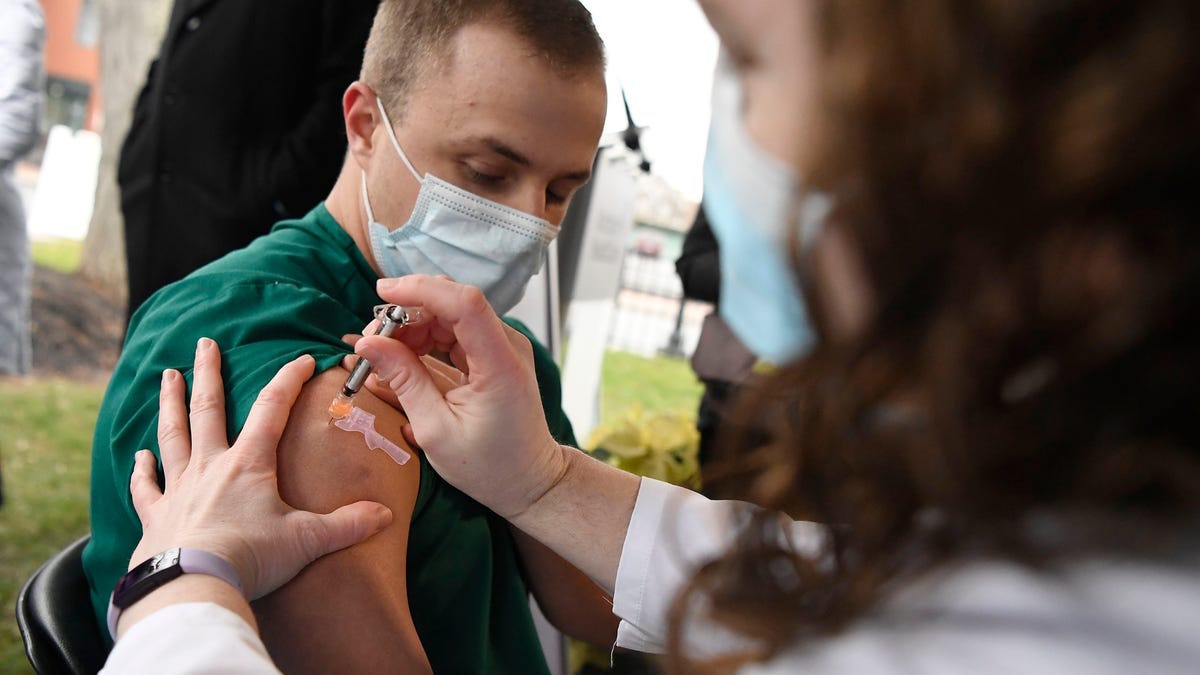| USA TODAY

COVID-19: Current vaccines may be less effective in some variants
Variants of COVID-19 are emerging in America and scientists are learning that the vaccine may not work as well against them.
USA TODAY
It didn’t start like that. When the first photo appeared on Instagram of that person you know taking the COVID-19 vaccine, you felt elated. A certain relief that something different is coming. You were happy that they were safe and hoped that one day soon you too would know that feeling.
Months after the vaccine was launched, most Americans still do not know this feeling. Public health officials warned that it would take time to vaccinate everyone they wanted, but most people did not expect the confusion and inconsistencies, they probably could not prepare for the feeling of seeing some people close to a return to normal while they continue to wait.
Now when you see the photo, read the text, you get the call that someone you know just got the vaccine, has another feeling too: envy.
“Whenever you have a little hope and it ends, you get depressed, angry or resentful,” said therapist Steven Stosny. “And sometimes you will blame someone else, even if it is the system that is really causing the stress.”
Millions of Americans have had to struggle to find vaccines. Some spent hours updating websites obsessively, others drove hundreds of miles to make appointments. The rules on vaccine distribution vary by state, increasing the feeling of frustration.
Analyze: The distribution of the COVID-19 vaccine has tarnished the ‘miracle’
Implementation of the COVID-19 vaccine: It didn’t work, but change is coming
“I’m so jealous of people who have successfully scheduled vaccination appointments that I could scream at, “wrote Twitter user @RaxKingIsDead. @ Ann_Bourke_4 lamented, “I am very envious of the vaccine now. I only have to arrive in April. ”
USA TODAY talked to mental health experts about how to deal with vaccine envy.
Recognize that you are not a bad person because you feel that way
Envy is a valid emotion, psychologists say, and it makes sense in this crisis. People have been waiting a long time to get back to the things they love – to get back to each other – and seeing someone get something you want can be painful.
Many people are also angry that they cannot do more to help the people they love – elderly parents, children with disabilities. When someone feels powerless, he can take the blame.
“It doesn’t make you a bad person because you have that kind of feeling,” said Robert Enright, a licensed psychologist and professor at the University of Wisconsin, Madison, who studies moral development and the science of forgiveness.
Distinguish between envy and resentment
Experts say that we are all susceptible to envy when someone has something we want. We can envy a neighbor’s house or a friend’s trip. Resentment, said Enright, is different. It is what someone tends to feel when he believes that someone has done wrong.
“If someone came to me and said, ‘I’m very resentful of that other person,’ I would ask, ‘Tell me what you think is unfair?’ he said.
If you are envious of your friend who is a nurse, she got the vaccine, this is valid. If you feel resentful towards them, it suggests that you believe that they did something wrong. In the nurse’s example, resentment would be lost. However, if you know someone who did something dishonest to get the vaccine, it would be unfair, you would resent the injustice and, as Enright says, you would be in a position to forgive him.
With COVID, Enright said that most people who provoke feelings of envy or resentment are probably not to blame.
“It is likely that this person is not responsible for the distribution of justice,” he said.
If you’re feeling left out, don’t disconnect
The vaccine created a divide – between those who can move around the world with less fear and more certainty and those who feel they are still living a nightmare.
Some people have seen their entire families vaccinated while they wait. Some are in groups of friends where vaccinated people exchange stories about their symptoms, while unvaccinated ones wish to have their own.
If you are in a social circle where many people are vaccinated and you are not, Enright said it is important to distinguish between the type of exclusion you are facing. Deliberate exclusion – not being invited to the party – or indirect exclusion – when you were unable to attend the party because of traffic.
“Feeling left out is a perfectly reasonable response, but there is a big difference between these two categories,” he said.
Experts say you can try to share your feelings with the group, so that they can offer support. Stosny said it is important to maintain “a connection attitude”. Keep reaching out to the people you love.
“The biggest antidote to resentment is connection,” he said.
Rephrase your thinking and forgive yourself if you need to
What’s difficult about envy and especially resentment, experts say, is that they tend to make us feel bad about ourselves.
“If you’re not careful, living with that envy, that feeling of direct exclusion, living with resentment, you may end up not liking yourself for … having those thoughts,” said Enright.
Negativity towards yourself, he said, does not promote mental well-being, while forgiving yourself in these circumstances can be quite healing.
Stosny also said that these feelings can have a negative effect on our immune system.
“Envy, jealousy and resentment increase inflammation, which makes us more susceptible to infections,” he said. “Focus on what you can do to make it more likely that you will remain healthy. … Resentment, in the end, will not make the vaccine more available.”
